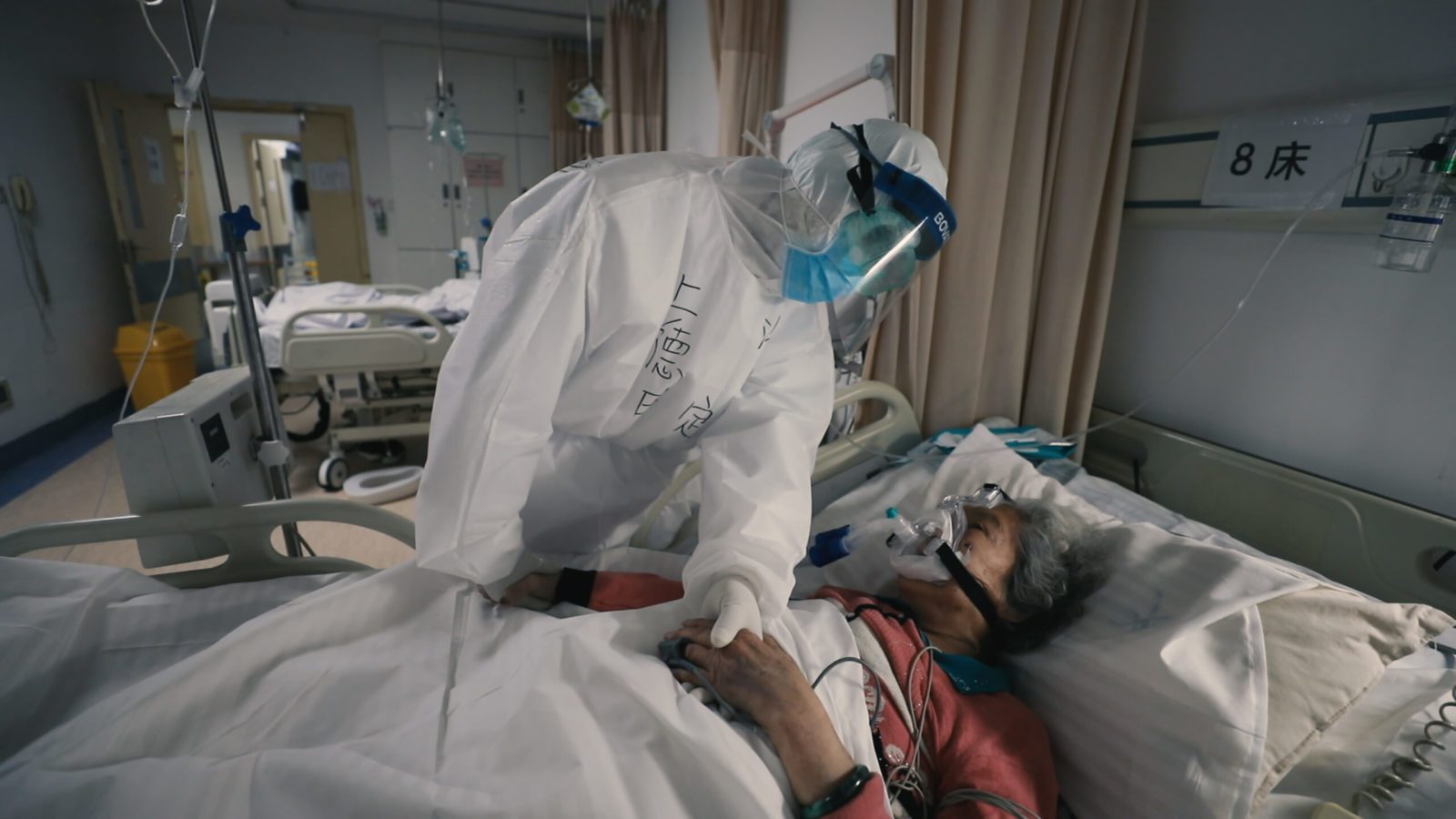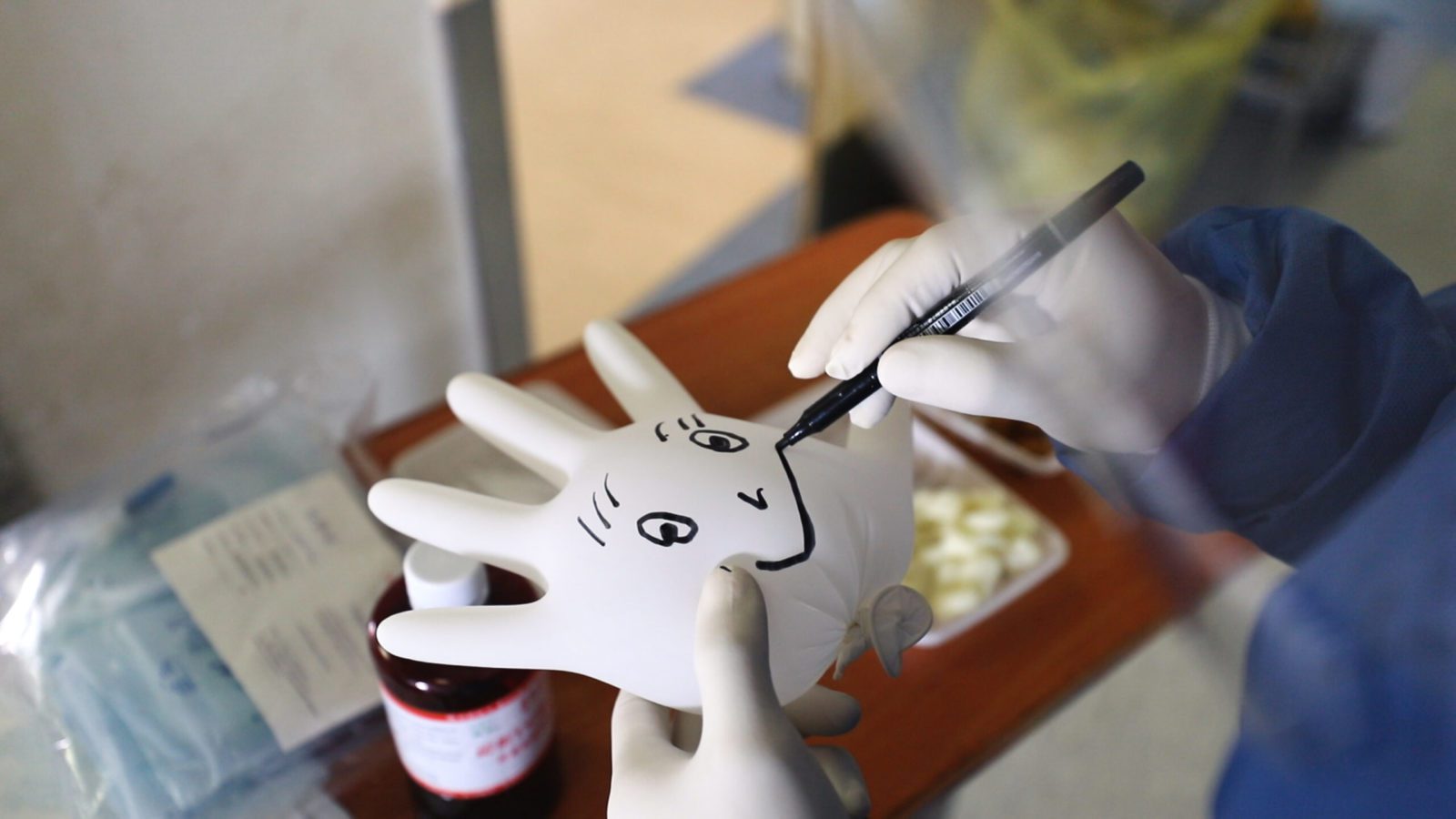Harking back to a time when Wuhan was the epicentre of the COVID-19 pandemic, 76 Days provides a fly-on-the-wall view of the city’s initial response to the coronavirus. Devoid of political inferences, the film captures the very human experiences of patients, families and healthcare workers during a time of immense uncertainty and fear. The film, whose title refers to the 76-day lockdown that the city endured, provides footage within hospital walls that stretch beyond what North American audiences are used to seeing.
The Chinese government’s lack of transparency and tendency toward misinformation during the pandemic can rightfully be criticized but 76 Days focuses on the humanity of the crisis rather than its politics. With his two collaborators in China (Weixi Cheng and Anonymous), Hao Wu, who is currently based in New York, has put together a collection of raw, visceral footage that has unfortunately become relatable to the world at large. While somehow overcoming the usually strict censorship in China, fears of potential retribution linger, with one of the filmmakers still choosing to remain anonymous.
When 76 Days had its world premiere at the 2020 edition of the Toronto International Film Festival, it was the first COVID-19 documentary to screen at an international film festival. Since September, other documentaries about the COVID-19 pandemic have slowly made their way onto various platforms but the film still stands out in its documentation of people navigating the great unknown. COVID-19 is still frightening but it was only a short time ago when our collective fears were fanned by uncertainty. 76 Days brings us back to this uncertain time period, serving as a reminder of how far we’ve come while also lamenting the many tragedies that we will never be able to fully leave behind.
Healthy Debate had a chance to discuss 76 Days with Hao Wu, which is now available for digital streaming on Hot Docs’ digital platform (until Jan. 7). This is an edited transcript of our conversation.
Wilson Kwong: When we first spoke with each other back in September, hardly anyone had seen the film and you had no idea how audiences would respond to it. Now that 76 Days has played at other film festivals, have you gotten a sense of how audiences are reacting?
Hao Wu: I think the responses have been different for different audiences. For people who are from China and are now overseas, their emotional response has been a lot stronger, with many people telling me how they cried from beginning to end. I think it’s because we all have friends and family back in China and since the beginning of January, it’s been a long period of constant anxiety and worry about the safety of our family members. So this film really brings out an emotional release for them. For the more typical North American audience, I’ve been hearing from the film festival audience about how they were surprised to see how well organized the medical system and response was in Wuhan. Early reports about the Wuhan lockdown in the media focused on the chaos so they were shocked to see how things stabilized relatively quickly in just 76 days. They were able to see a lot of the resources in terms of equipment and personnel and also all the attention that healthcare providers gave to patients.
WK: Are your collaborators nervous about the Chinese government’s reaction to the film now that it’s been officially released?
HW: I feel extremely happy that most of the critics in the media, and the audience so far, have recognized that the focus of the film is on our call to humanity. We’re not trying to make any political statements in the film so I think my collaborators back in China are feeling more relaxed for sure. But having said that, we continue to decline any type of interview requests from Chinese-language media right now.
WK: And what about the subjects featured in the film – do you know if any of them have gotten a chance to see it?
HW: They definitely know that the film exists but we haven’t been able to show it to them yet. Part of it is because we’re still wary of exposing this film too much within China and we also didn’t collect the contact information from all the subjects during filming so wouldn’t be able to get in touch with every single person.
WK: With the film being released right in the midst of the second wave, do you think that changes the way audiences will react to the film?
HW: It’s a little crazy to me that we’re facing this big wave of resurgence in the United States but I think this might actually make the film more relevant. I was reading an article in the Wall Street Journal that talked about how some medical workers are feeling frustrated about how the public doesn’t always follow public health measures. And I think that if more people saw this film, they might have more respect for healthcare professionals and be more inclined to follow public health measures.
WK: That’s interesting – it’s almost as if the film might encourage people to be more compliant with public health recommendations.
HW: Exactly. I feel like a lot of people in the United States (and Canada) haven’t seen COVID-19 up close. There’s been very little visual evidence of COVID-19, even in news programs. With this film, I know it’s going to be a hard watch, especially while we’re still living through the pandemic. People may think they already know too much about the virus but I think many people haven’t confronted the absolute tragic consequences of COVID-19. If people are willing to watch this film and make some personal connections to the tragedies depicted in the film, maybe it would help sway people to follow these public health measures.
WK: It’s also strange watching the film now because my understanding is that things in Wuhan, and in many parts of Asia, are pretty much back to normal in many ways. And everything happening in 76 Days is more relatable to the current situation in North America compared with the situation in Asia.
HW: Absolutely. Back in January and February, I had lots of friends in China who wanted me to take their family in here in New York. But as COVID-19 started to hit the United States, we started seeing the reverse and the tide turned the other way. People started to go back to China, wanting to get away from the pandemic here.
WK: So do you think the film will resonate more with one audience versus the other? Specifically, the North American audience that is still going through the pandemic in its full form or the Chinese audience that has already started moving on?
HW: I honestly don’t know because in China, there have been so many films and TV programs about COVID. Even if this film did come out in China, there are so many things being released that I’m not sure people would actually watch it. Overseas (in North America), especially back in September, this was essentially the first film about COVID-19. So there was a freshness factor to it. To be honest, I think the film will resonate most with Wuhan audiences but at the moment, we don’t have any plans to release this in China for a few reasons. One reason is that one of our co-directors licensed some footage to a domestic production company in China as well so there might be some legal rights issues. Another reason is that I don’t want this film going through the censorship process in China. Even though the film isn’t political, they are still going to demand changes and I wouldn’t want to go through that process.
WK: I know that filmmakers often sit back and reflect on their own film after it’s released. With 76 Days, I would think that your reflection period is unique in that the global pandemic around you might also shape how you view your own film. With that in mind, looking back, is there anything you would’ve changed about 76 Days?
HW: Not really. To be honest, I feel like it’s almost a miracle that this film even happened. I was fortunate to have found my two collaborators who let me use their footage and fortunate that they were able to film during such chaotic times. And I was very fortunate that the Wuhan lockdown story had a very definite ending. If I had been filming in the United States, I honestly would not know how to end the film. So looking back on the circumstances, I think everyone who worked on the film did the best job possible under the circumstances. I also feel encouraged that some people have reached out to me about how moved they were by the film. I think that the film’s message needs to be relayed to the entire country, especially to those who refuse to believe that COVID-19 is real. I hope that audiences will talk about 76 Days with their friends and families, or on social media, and encourage more people to watch this film.




The comments section is closed.